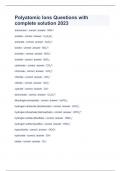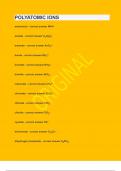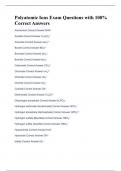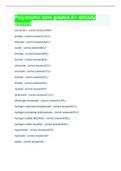Arsenate aso₃³⁻ Study guides, Class notes & Summaries
Looking for the best study guides, study notes and summaries about Arsenate aso₃³⁻? On this page you'll find 4 study documents about Arsenate aso₃³⁻.
All 4 results
Sort by

-
Polyatomic Ions Questions with complete solution 2023
- Exam (elaborations) • 2 pages • 2023
- Available in package deal
-
- $11.49
- + learn more
Polyatomic Ions Questions with complete solution 2023 ammonium - correct answer NH4⁺ acetate - correct answer C₂H₃O₂⁻ arsenate - correct answer AsO₃³⁻ borate - correct answer BO₃³⁻ bromate - correct answer BrO₃⁻

-
POLYATOMIC IONS|UPDATED&VERIFIED|100% SOLVED|GUARANTEED SUCCESS
- Exam (elaborations) • 3 pages • 2023
- Available in package deal
-
- $13.99
- + learn more
ammonium NH4⁺ acetate C₂H₃O₂⁻ arsenate AsO₃³⁻ borate BO₃³⁻ bromate BrO₃⁻ bromite BrO₂⁻ carbonate CO₃²⁻ chromate CrO₄²⁻ chlorate ClO₃⁻ chlorite ClO₂⁻ cyanide CN⁻ dichromate Cr₂O₇²⁻ dihydrogen phosphate H₂PO₄⁻ hydrogen carbonate (bicarbonate) HCO₃⁻ hydrogen phosphate (biphosphate) HPO₄²⁻ hydrogen sulfate (Bisul...

-
Polyatomic Ions Exam Questions with 100% Correct Answers
- Exam (elaborations) • 2 pages • 2023
-
- $11.49
- + learn more
Ammonium Correct Answer NH4⁺ Acetate Correct Answer C₂H₃O₂⁻ Arsenate Correct Answer aso₃³⁻ Borate Correct Answer BO₃³⁻ Bromate Correct Answer bro₃⁻ Bromite Correct Answer bro₂⁻ Carbonate Correct Answer CO₃²⁻ Chromate Correct Answer cro₄²⁻ Chlorate Correct Answer clo₃⁻ Chlorite Correct Answer clo₂⁻ Cyanide Correct Answer CN⁻ Dichromate Correct Answer Cr₂O₇²⁻ Dihydrogen phosphate Correct Answer H₂PO₄⁻ ...

-
Polyatomic Ions graded A+ already passed
- Exam (elaborations) • 2 pages • 2022
- Available in package deal
-
- $8.49
- + learn more
Polyatomic Ions graded A+ already passedA polyatomic ion is a charged particle which has two or more atoms held together by covalent (sharing of pairs of electrons) bonds Some rules: 1. Ions that end in ate have oxygen in them. 2. Elements in the same family make similar ions. So for example if you know chlorate, you also know bromate and iodate too (BrO3-, and IO3-). There are some exceptions. Nitrate is not like phosphate even though nitrogen and phosphorus are in the same group. However ar...

Do you wonder why so many students wear nice clothes, have money to spare and enjoy tons of free time? Well, they sell on Stuvia! Imagine your study notes being downloaded a dozen times for $15 each. Every. Single. Day. Discover all about earning on Stuvia


